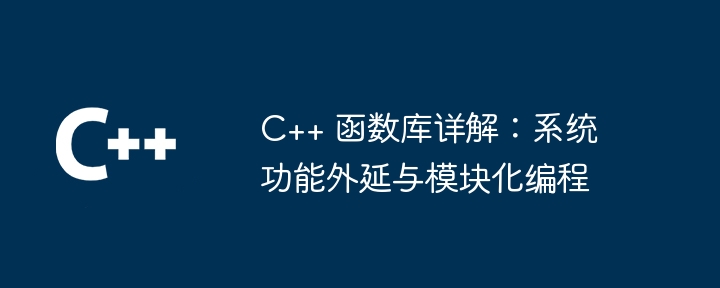
C function library provides predefined functions, which can extend program functions and simplify programming. Types include standard libraries (STL), platform-specific libraries, and third-party libraries. Advantages include code reuse, consistency, feature extension, and modular programming. Usage steps: include header files, use namespaces, and call functions. Practical case: Storing and manipulating numbers using STL, showing examples using the vector library.

Detailed explanation of C function library: system function extension and modular programming
The function library is a set of pre-written functions. Can be used to extend the functionality of C programs, significantly simplifying programming tasks. This article takes an in-depth look at C libraries, including their types, benefits, and how to use them.
Function library type
Advantages of Function Library
Using the function library
Using the function library only requires a few simple steps:
usingdirective to import the function library namespace, such asusing namespace std;.Practical case: Using STL to store and operate numbers
Sample code:
#include#include using namespace std; int main() { // 创建一个整数向量 vector numbers = {1, 2, 3, 4, 5}; // 添加元素 numbers.push_back(6); // 遍历并打印元素 for (int num : numbers) { cout << num << endl; } // 获取向量大小 cout << "Vector size: " << numbers.size() << endl; return 0; }
Output:
1 2 3 4 5 6 Vector size: 6
This example shows how to use thevectorfunction library to store and manipulate integers.
The above is the detailed content of Detailed explanation of C++ function library: system function extension and modular programming. For more information, please follow other related articles on the PHP Chinese website!
 What are the differences between c++ and c language
What are the differences between c++ and c language Recommended learning order for c++ and python
Recommended learning order for c++ and python Cost-effectiveness analysis of learning python and c++
Cost-effectiveness analysis of learning python and c++ Is c language the same as c++?
Is c language the same as c++? Which is better to learn first, c language or c++?
Which is better to learn first, c language or c++? The difference and connection between c language and c++
The difference and connection between c language and c++ C++ software Chinese change tutorial
C++ software Chinese change tutorial Cost-effectiveness analysis of learning python, java and c++
Cost-effectiveness analysis of learning python, java and c++



